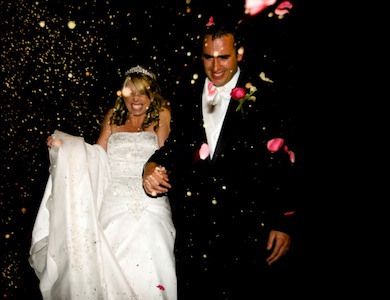Society says we should be elated for our friends and relatives who announce engagements, weddings, and babies, but happiness isn’t always the feeling that comes up.
It’s almost a week later, and I am still finding glittery confetti in strange places. It’s a strange, but not unpleasant problem to have. There is something particularly intoxicating about the narrative of this confetti—it was thrown at my dear friends as they entered their wedding reception.
The glittery confetti wedding was the fourth I’d been to since late March. The week before the wedding, at a meal for another set of friends who’d just gotten married, another friend received a call notifying her that her sister-in-law was pregnant. In the hallway of the apartment building, she cried, completely overcome with feelings of exhaustion and loss. I kept her company, relieved that someone understood.
The thing about weddings and births is that they’re the end of something as much as they are the beginning. At the same time as they open the world, they close it, and that closing for me has felt sharp and rife with confusion. While the operating system orders that I should feel and express pure, uncomplicated joy, I’m becoming more and more skeptical that such a thing does, and should, exist.
Amid the crazy dancing and emotional ceremonies that accompany these rituals, there is fun and joy, but for me, and I suspect for others, it’s always complicated, and always tinged with sadness that feels unexpressable. It’s become a negotiation of sorts—how to hold deep love for friends with my frustration over the fact that everyone seems to be acting out the same script—engagement, marriage, babies—as if these were the only options.
It would seem that there are some things one can never say when a person announces a wedding or an engagement or a pregnancy, and those things include asking questions like, “Why?” and “Are you sure?” A certain social performance is dictated which includes shrieking with joy and asking to see the ring (placing someone who does not have or want a ring in an uncomfortable situation). One does not express confusion or sadness or anger, at least not to the person who’s made the announcement. In short, if you aren’t feeling wild, unencumbered happiness, fake it.
There are many moments in our lives when we do not want unsolicited feedback, and those especially include times of particularly acute happiness. But where is the line between not being allowed to express feelings and not being allowed to feel them? Our choices do not take place in a vacuum, and bringing critique to institutions like marriage is not necessarily about making someone feel badly about choices. The idea that we should only feel and express joy and nothing more is about enabling constructions that tell us that it is inappropriate to question.
And then there is the not insignificant matter of isolation that comes with having an analysis around conventions like marriage. A good friend of mine refers to this as “being on the island.” No one wants to be alone on the island, and yet, our politics sometimes place us there. Even without a certain political analysis, though, there’s loss in these particular changes, whether or not we see them as inevitable, and with loss, there has to be space to mourn. There’s a societal script for mourning, of course, but sitting in a place of deep emotion and confusion when expectations are otherwise is indeed uncharted territory.
Chanel Dubofsky is a writer in Brooklyn, New York, and the creator and editor of the Marriage Project, an interview series about marriage in imagination and reality. She has published essays in the Forward, Tablet, Gender Focus and The Pursuit of Harpyness, and fiction at Monkey Bicycle, Matchbook and Quick Fiction. She blogs at Diverge (www.idiverge.wordpress.com).
Related Links:

